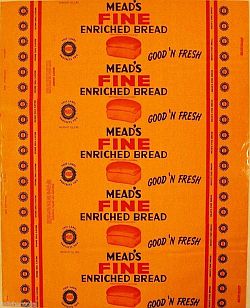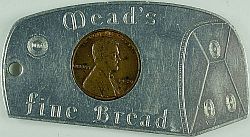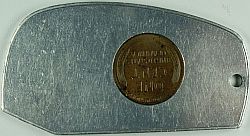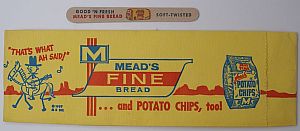
Mead's Fine Bread
Bread Wrapper from Mead's Fine Bread

"Mead's Fine Enriched Bread" "Good and Fresh"
Encasements for coins take on many different shapes. The common round shape is well known in several diameters. However, one of the most popular and unusual shapes to collect is the bread loaf shape. There is only one bread shape that I know about and that is the Mead's Fine Bread
encased. The design of the encasement is such that the piece looks like a loaf of bread in three dimensions, while only being a two-dimensional object. Some clever perspective design shows the end of the loaf as well as the side. The piece has Mead's fine Bread
on the front and the back is plain. There is no known record of who created these encasements for Meads. The encasement is approximately 2 ½ inches wide by 1 ¼ at its tallest point. The encasement material is the traditional aluminum and is the thickness of a cent. It appears to have been made to use with a key chain as it has a hole at one end.

An encased cent in n aluminum loaf of bread. Obverse reads: "Mead's Fine Bread" The encasement has wrapper lines on the right end to give it a 3-D look.

Reverse of the loaf of bread encased cent. Reverse is blank only showing the reverse of the coin.
Mead's was founded in 1918 by J.H. Mead and his four sons. Over the years, the Mead brothers and their families split up the operations. In 1958 they consolidated the company. In 1978, the
sold the company to Fehrmead Food Corp., a Dallas-based holding company. The Mead Bread Company maintained plants at Lubbock and Big Spring, Texas, and at Hobbs, Roswell, and Clovis, New Mexico. They sold bread throughout the Southwest. The company used this jingle:
Golden brown, delicious
So look for the bag with the great big M
It's delicious and so nutritious
That's what 1 said
Mead's fine bread."
Bread Wrapper from Mead's Fine Bread

A paper hat used by Mead's employees - "That's What I Said" "Mead's Fine Bread and Potato Chips, too" At the top is a nail file given away as a promotional item.
The Mead company is famous in legal circles for setting a monopoly precedent at the Supreme Court of the United States. Mead's Fine Bread operated in Texas and New Mexico. They had a competitor in Santa Rosa, Texas, and Mead's cut the price of their bread from 14¢ to 7¢. They only cut the price in Santa Rosa, but not in other Texas or New Mexico locations. In 1954 the company was sued by a competitor The Moore Bakery. They alleged that Mead's Fine Bread sold bread both locally and interstate, and, in the course of such business, maintained prices in interstate transactions but cut prices in intrastate transactions in petitioner's locality, thus driving petitioner out of business. December 6, 1954, the United States Supreme Court found that Mead's Fine Bread was in violation §2 of the Clayton Act and § 3 of the Robinson-Patman Act... this was a Landmark case in interstate competition. The Supreme Court ruled that this was monopolistic behavior and that as an interstate and intrastate company is was illegal to cut the prices in one town without cutting their prices in all their locations.
(https://caselaw.findlaw.com/us-supreme-court/348/115.html - United States Supreme Court, MOORE v. MEAD'S FINE BREAD CO.(1954))
Home | Articles | Varieties | Coin Links | About | Terms of Use
Site Copyright 1999-2021 by Bruce Perdue Email: Webmaster All Rights Reserved ©Copyright Bruce Perdue